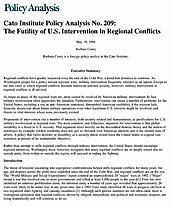Regional conflicts have greatly increased since the end of the Cold War, a trend that promises to continue. As Washington gropes for a policy toward regional wars, military intervention frequently emerges as an option. Except in the rare cases in which regional conflicts threaten American national security, however, military intervention in regional conflicts is ill-advised.
As tragic as many of the regional wars are, most cannot be resolved by American military intervention. In fact, military involvement often aggravates the situation. Furthermore, intervention can create a number of problems for the United States, including a rise in anti-American sentiment, diminished American credibility if the mission fails, domestic skepticism about future military operations even when legitimate U.S. interests might be involved, and threats to vital interests where none previously existed.
Proponents of intervention cite a number of interests, both security related and humanitarian, as justifications for U.S. military involvement in regional wars. The most common, and fallacious, argument for intervention is that global instability is a threat to U.S. security. That argument relies heavily on the discredited domino theory and the notion of deterrence by example. Global instability does not, per se, threaten vital American interests and is the normal state of affairs. A policy that views disorder or instability as a security threat would force the United States to expend vast resources in pursuit of an unattainable objective.
Rather than attempt to stifle regional conflicts through military intervention, the United States should encourage regional initiatives. Washington must, however, recognize that many regional conflicts are so deeply rooted that no outside party, from within or outside the region, will succeed in ending the fighting.

This work is licensed under a Creative Commons Attribution-NonCommercial-ShareAlike 4.0 International License.
